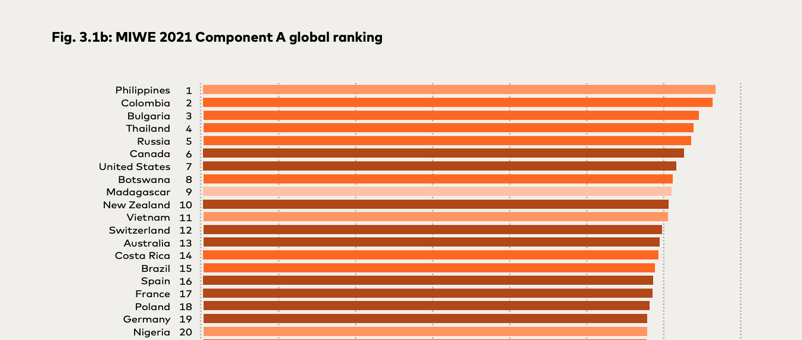Business
Women in PH Emerged as One of the Most Resilient Entrepreneurs


Despite the COVID-19 pandemic having a disproportionate impact on women entrepreneurs across the world – especially those in the developing economies – women are demonstrating the resilience to succeed against the odds, according to a recent Mastercard study.
Women in the Philippines have fared particularly well in making entrepreneurial progress, despite significant social-cultural and infrastructural barriers threatening to impede their growth. Lack of government SME support, poor access to entrepreneurial finances, and a severe lack of education opportunities remain the major constraints to advancing women’s entrepreneurship in the Philippines and Asia’s lower-middle-income economies overall.
Encompassing 65 economies and 82.4% of the global female labor force, the fifth edition of Mastercard’s Index for Women Entrepreneurs (MIWE) examined women’s progress in the global entrepreneurship landscape over the last two years. The findings reveal that despite worldwide efforts to mitigate the pandemic’s effects, women have experienced considerable economic and social implications. As a result, the expected time to overcome the worldwide gender gap may be extended by another 36 years.
MIWE’s latest report has also revealed an encouraging trend for women’s entrepreneurship in Southeast Asian economies such as the Philippines, Thailand, Indonesia, and Vietnam. Women in these economies were seen engaging in high levels of entrepreneurship, sometimes at parity with men, even though the environment in which they operate remains entrenched with challenges. Despite the comparatively lower participation of women in the workforce, the Philippines remained a global leader for the third consecutive year when it comes to women’s advancement outcomes and is just as driven by opportunity as women in highly business conducive environments.


The Ranking: top economies for women’s advancement outcomes. The graph above shows the latest overall ranking of the 65 economies in relation to women’s advancement outcomes (Component A) where the Philippines takes the top spot for the third consecutive year.
“Women entrepreneurs in the Philippines are a critical part of the country’s economic recovery. Hence, there is a need to ensure that women entrepreneurs, especially owners of smaller businesses, have access to the knowledge, resources, and tools they need to thrive and scale. Across the world, Mastercard is working with key partners in the public and private sectors to provide 25 million women entrepreneurs with payments technologies and access to initiatives like the company’s Digital Acceleration program, to help them participate in the digital economy and become more resilient,” said Simon Calasanz, Country Manager, Philippines, Mastercard.
Asia Pacific leads the world on all key indicators that determine the success of women’s entrepreneurship
Six economies from the Asia Pacific region have found their place on MIWE 2021’s global leaderboard for being the best places in the world for women entrepreneurs. New Zealand, Australia, and Taiwan have emerged as the regional leaders, propelled by strong scores across all three components that constitute MIWE: women’s advancement outcomes, knowledge assets, and financial access. These economies continue to furnish the conditions required to facilitate women’s access to financial support and services and their ability to start, operate, thrive, and adapt to the market circumstances. In these economies where the entrepreneurial ecosystem is enabling, women were driven by the pursuit of new opportunities emerging from the pandemic, demonstrating a proactive and upbeat entrepreneurial attitude that will be vital in supporting economic recovery and long-term growth.
| 2021
Rank |
Economy | Rank change from 2020 | 2021 MIWE Score |
2021
Rank |
Economy | Rank change from 2020 | 2021 MIWE Score |
| 1 | United States | – | 69.9 | 11 | France | – | 64.6 |
| 2 | New Zealand | – | 69.8 | 12 | Ireland | 2↓ | 64.5 |
| 3 | Canada | – | 68.6 | 13 | Denmark | 2↑ | 64.5 |
| 4 | Australia | – | 67.2 | 14 | Belgium | 5↑ | 64.3 |
| 5 | Switzerland | 2↑ | 66.7 | 15 | Spain | 6↓ | 63.3 |
| 6 | Taiwan | 2↑ | 66.3 | 16 | Uruguay | 7↑ | 63.1 |
| 7 | Germany | 7↑ | 66.2 | 17 | Hong Kong SAR | 1↑ | 62.7 |
| 8 | Israel | 2↓ | 65.3 | 18 | Singapore | 1↓ | 62.2 |
| 9 | United Kingdom | 4↑ | 64.9 | 19 | Thailand | 2↑ | 61.8 |
| 10 | Sweden | 5↓ | 64.9 | 20 | Chile | 4↓ | 61.7 |
The Ranking: top economies for women entrepreneurs (Asia Pacific economies are in bold)
In Singapore and Taiwan, access to finance ranked higher than anywhere else in the world, while New Zealand topped global rankings for having the most supportive entrepreneurial conditions. On average, high-income economies in the Asia Pacific scored higher in providing a dynamic landscape for women entrepreneurs, unhindered by access to finances and opportunities. However, in certain high-income economies, such as Japan, women continue to be underrepresented economically and have a limited presence in the business scene.
Gender-focused policies and financial inclusion remain key to unlocking women’s entrepreneurial potential
Although MIWE points to the pandemic being particularly taxing on women, fewer than 10% of COVID-19 recovery measures implemented worldwide include gender-sensitive strategies. In economies such as Canada and Argentina, women’s progress has been positively influenced by gender-focused policies implemented to address women’s economic security during the pandemic.
Likewise, in Asia, women entrepreneurs in Thailand, Singapore, and Taiwan have benefited from initiatives aimed at supporting not them directly but small enterprises where they are highly represented. Such correlation proves that government policies that intentionally influence women’s entrepreneurship can meaningfully contribute to a swifter recovery.
As part of Mastercard’s commitment to creating a world where women entrepreneurs are equally represented and supported, the company made a global commitment to connect 25 million women entrepreneurs to the digital economy by 2025. Not only will empowering women’s entrepreneurship act as a catalyst for growth and innovation, but it will strengthen the communities that surround successful women, resulting in a more equitable and long-term global recovery.













